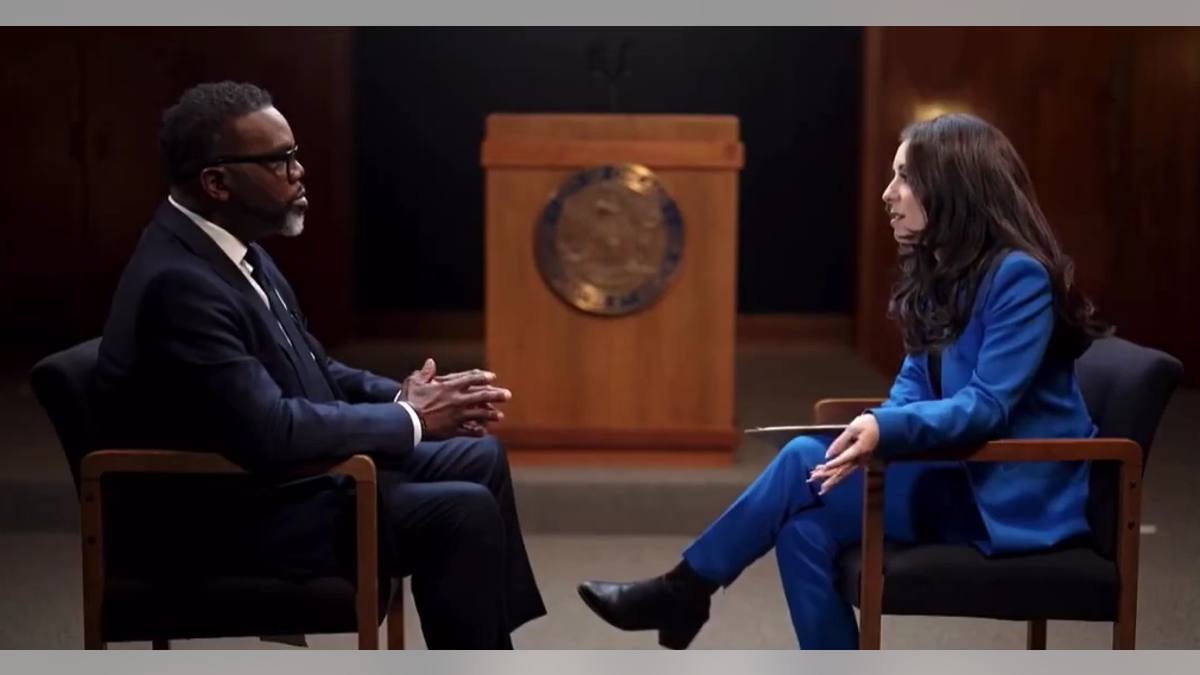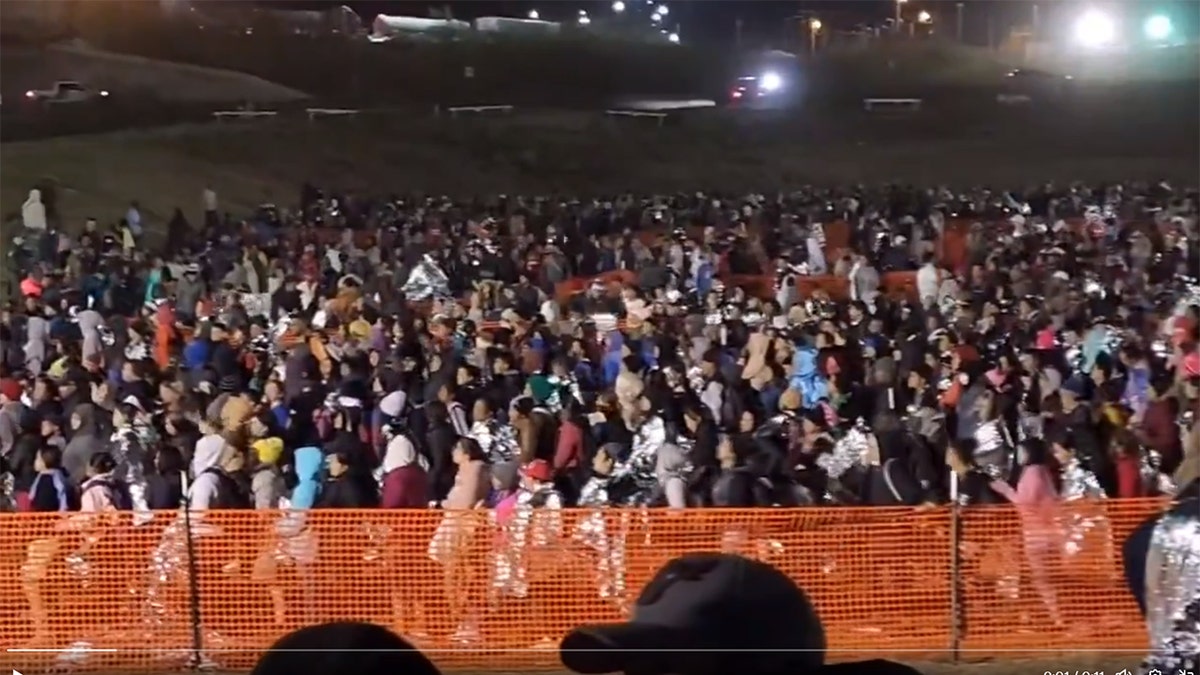Chicago scrambling to find shelter for migrants ahead of dangerous cold
Chicago residents Sam Sanchez and Cata Truss calls out the city for putting migrants' needs ahead of citizens
Chicago Mayor Brandon Johnson was pressed about his management of the city amid its migrant crisis and whether it means raising taxes on citizens.
Republican governors like Greg Abbott of Texas have sent buses of asylum seekers to Democratic-controlled states and sanctuary cities. Republicans argue the action is necessary to show the rest of the country what border states are dealing with due to the surge of migrants. The bussing of migrants to major cities like New York City and Chicago has forced some Democratic leaders to admit the migrant crisis is overwhelming their cities and that President Biden has failed to take proper action to stem the tide.
Johnson has warned that the crisis is "not sustainable" and has called for further federal assistance to help his city address the growing number of migrants.
CBS Chicago reporter Sabrina Franza confronted Johnson about his management of the city during an in-person interview earlier this month, arguing that his constituents are feeling neglected by his prioritization of foreign migrants.

Chicago Mayor Brandon Johnson was repeatedly questioned in a recent interview about whether he would raise taxes to respond to the migrant crisis. (CBS Chicago)
CHICAGO RESIDENTS RAIL AGAINST PLANNED MIGRANT SHELTER
"When we talk to voters, a lot of times they'll voice concerns about being frustrated that they don't think your administration is hearing them because of the money that's being spent on the migrant crisis that they're not seeing. It seems like this money is just appearing out of thin air but isn't being invested in their own communities," Franza said. "Why do you think they feel that way?"
Johnson argued that this is because "Black and Brown neighborhoods, and particularly Black communities," have been "dis-invested" in," and called on Franza to "keep in mind that the migrant crisis, this international global crisis, really requires a federal resource response."
Johnson is one of multiple leaders who have called for federal action in order to handle the migrant crisis. In December, New York City Mayor Eric Adams came home after a visit with lawmakers in Washington D.C. to announce that there would be no assistance for the time being.
"As I left Washington, D.C., I did not leave with optimism. I left with the cold reality that help is not on the way in the immediate future," Adams warned.
Later on during the interview, Franza asked Johnson, "What will the city of Chicago do to pay for this? Because you’ve said it’s not sustainable, you’ve said you’re running out of space, it’s disrupting the very fabric of the city."
"It did not stop my administration from investing in the unhoused," Johnson responded and spoke about how other cities have looked at making budget cuts, but declared Chicago has not yet reached that point.
"Will you be taxing, adding a tax to help pay for this?" Franza asked.
Johnson laughed and said, "Well, you know, I think people are clearly familiar with what my vision is for revenue in this city, and my revenue, of course, is committed to making sure that we are doing everything we can to address the unhoused crisis in this city. Seventy thousand people are unhoused in this city are Black families, and that’s why I invested a quarter of a billion dollars in my budget to do just that."

The bussing of migrants to major cities like New York City and Chicago has forced some Democratic leaders to admit the migrant crisis is overwhelming their cities and that President Biden has failed to take proper action to stem the tide. (Fox News)
IL ALLOCATES $160 MILLION TO AID MIGRANTS IN CHICAGO DURING WINTER MONTHS
"But will you add a tax to help pay for the migrant crisis?" Franza pressed.
"Here’s what I’ve said repeatedly," he began, noting that Chicago's migrant situation is part of an "international crisis."
Franza interjected, "And we’ve heard you say that."
"Okay, so you know the answer then," Johnson replied.
"Well, no, because the answer I asked for is ‘Are you adding a tax?’" Franza inquired.
"The answer is the federal government has to do its job," Johnson said.
"Well, what if they don’t?" Franza asked.
Johnson then said there are "30,000 Ukrainian refugees" temporarily housed in Chicago amid the war in Ukraine after the Russian invasion and asked, "What's the difference between Ukrainian refugees and those who are seeking asylum from Central and South America?"
"Right, but that’s not the question the people of Chicago are asking. The people of Chicago want to know, will you raise a tax, whether it be a property tax or implement something else to help pay for this?," Franza continued to press for an answer.
Johnson argued nobody has asked him this question, claiming, "I did not raise property taxes," yet managed to invest in causes from homelessness to mental health in his city.
"My administration has not missed a beat, we have built an operation centered around people’s humanity, to respond to this international crisis that the federal government has been negligent in, and while doing all of that, I’ve still kept every single promise that I was going to invest in people," he said.
CLICK HERE TO GET THE FOX NEWS APP
"So you can commit to you not raising property taxes, regardless of how bad the situation gets?" Franza asked.
"My budget, the $16.77 billion that I just passed, 41 alders I believe supported this budget-" Johnson said.
"So is that a ‘Yes?’" Franza asked.
Johnson continued, "And we did all of that without raising property taxes, the evidence is in what I passed, we made all of these investments without raising property taxes. That’s the commitment that I made when I ran, that’s the commitment that I kept."










































